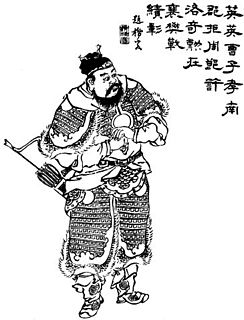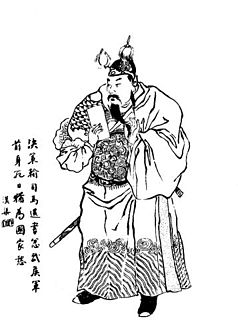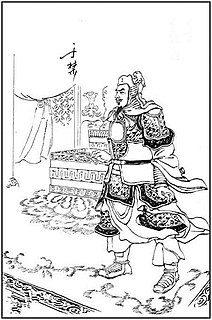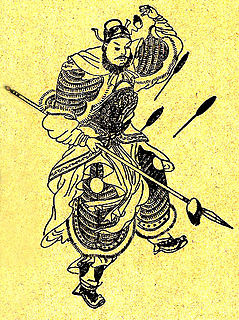 W
WCao Hong, courtesy name Zilian, was a Chinese military general of the state of Cao Wei during the Three Kingdoms period of China. He started his career in the late Eastern Han dynasty under the warlord Cao Cao, who was his older second cousin.
 W
WCao Ren, courtesy name Zixiao, was a military general serving during the late Eastern Han dynasty of China under the warlord Cao Cao, who was also his older second cousin. He continued serving in the state of Cao Wei – founded by Cao Cao's son and successor, Cao Pi – during the Three Kingdoms period. He played a significant part in assisting Cao Cao in the civil wars leading to the end of the Han dynasty. He was appointed as the Grand Marshal (大司馬) when Cao Pi ascended the throne, and was also credited by the latter for the establishment of Wei. However, Cao Ren was also once derided as a mediocre commander by Zhu Huan, a general from Wei's rival state Eastern Wu.
 W
WCao Zhen, courtesy name Zidan, was a military general of the state of Cao Wei during the Three Kingdoms period of China. He was an adopted son of Cao Cao, a warlord who rose to power in the late Eastern Han dynasty and laid the foundation for Wei. After Cao Cao's death and the end of the Eastern Han dynasty, Cao Zhen served under Cao Pi and Cao Rui, the first two emperors of Wei. He is best known for leading a successful defence of Wei from the first two of a series of invasions by Wei's rival state, Shu Han, between 228 and 229.
 W
WDian Wei was a military general serving under the warlord Cao Cao in the late Eastern Han dynasty of China. Famed for his enormous strength, Dian Wei excelled at wielding a pair of jis, each of which was said to weigh 40 jin. He was killed in action at the Battle of Wancheng while covering Cao Cao's escape from Zhang Xiu's forces.
 W
WGuan Yu, courtesy name Yunchang, was a Chinese military general serving under the warlord Liu Bei during the late Eastern Han dynasty of China. Along with Zhang Fei, he shared a brotherly relationship with Liu Bei and accompanied him on most of his early exploits. Guan Yu played a significant role in the events leading up to the end of the Han dynasty and the establishment of Liu Bei's state of Shu Han during the Three Kingdoms period. While he is remembered for his loyalty towards Liu Bei, he is also known for repaying Cao Cao's kindness by slaying Yan Liang, a general under Cao Cao's rival Yuan Shao, at the Battle of Boma. After Liu Bei gained control of Yi Province in 214, Guan Yu remained in Jing Province to govern and defend the area for about seven years. In 219, while he was away fighting Cao Cao's forces at the Battle of Fancheng, Liu Bei's ally Sun Quan broke the Sun–Liu alliance and sent his general Lü Meng to conquer Liu Bei's territories in Jing Province. By the time Guan Yu found out about the loss of Jing Province after his defeat at Fancheng, it was too late. He was subsequently captured in an ambush by Sun Quan's forces and executed.
 W
WLiu Bei, courtesy name Xuande (玄德), was a warlord in the late Eastern Han dynasty who founded the state of Shu Han in the Three Kingdoms period and became its first ruler. Though he was a distant relative of the Han imperial family, Liu Bei's father died when he was a child and left his family impoverished. To help his mother, he sold shoes and straw mats. When he reached the age of fifteen, his mother sent him to study under scholar and official, Lu Zhi. In his youth, Liu Bei was known as ambitious and charismatic. He gathered a militia army to fight the Yellow Turbans. Liu Bei fought bravely in many battles and grew famous for his exploits. Rather than join the coalition against Dong Zhuo, he joined his childhood friend Gongsun Zan and fought under him against Yuan Shao many times.
 W
WPang De, courtesy name Lingming, was a military general who lived during the late Eastern Han dynasty of China. He started his career under the warlord Ma Teng, who was based in Liang Province. In 211, Ma Teng's son Ma Chao, along with a coalition of warlords from Liang Province, started a rebellion against the Han central government, which was controlled by the warlord Cao Cao. After Cao Cao defeated Ma Chao and the coalition at the Battle of Tong Pass, Ma Chao fled to Hanzhong Commandery and took shelter under the warlord Zhang Lu. Pang De accompanied him to Hanzhong. When Ma Chao defected from Zhang Lu's side in order to join the warlord Liu Bei, Pang De remained in Hanzhong and eventually came to serve Cao Cao after Cao Cao defeated Zhang Lu at the Battle of Yangping and took over Hanzhong. In 219, Pang De fought at the Battle of Fancheng under Cao Ren's command against Liu Bei's forces led by Guan Yu. Pang De was captured in battle and eventually executed by Guan Yu when he refused to surrender.
 W
WWang Ping, courtesy name Zijun, was a military general of the state of Shu Han in the Three Kingdoms period of China. Originally a military officer serving under the warlord Cao Cao in the late Eastern Han dynasty, in 218 he defected to Cao Cao's rival Liu Bei, who later became the founding emperor of Shu, during the Hanzhong Campaign. Though, he was an excellent orator Wang Ping never learned to read because he joined the army at a young age yet he did not let his disability stop him and had his clerk help him with his reports. Known as a strict man, he steadily rose through the ranks to become a senior general. During his career, he defeated Zhang He and was the leading commander of the Shu forces during the Battle of Xingshi. The highest position he reached was Senior General Who Guards the North (鎮北大將軍).
 W
WXiahou Dun, courtesy name Yuanrang, was a Chinese military general and politician serving under the warlord Cao Cao during the late Eastern Han dynasty of China. He served for a few months under Cao Cao's successor, Cao Pi, before his death. As one of Cao Cao's most trusted generals, Xiahou Dun aided the warlord in his campaigns against Lü Bu, Liu Bei, Sun Quan and others.
 W
WXiahou Yuan, courtesy name Miaocai, was a Chinese military general and politician serving under the warlord Cao Cao in the late Eastern Han dynasty of China. He is known for his exploits in western China in the 210s, during which he defeated Cao Cao's rivals Ma Chao and Han Sui in Liang Province and the surrounding areas, and forced several Di and Qiang tribal peoples into submission. He was killed in action at the Battle of Mount Dingjun while defending Hanzhong Commandery from attacks by a rival warlord Liu Bei. Xiahou Yuan's death was highly dramatised in the 14th-century historical novel Romance of the Three Kingdoms, in which he was slain by Liu Bei's general Huang Zhong during a surprise raid.
 W
WXu Chu, courtesy name Zhongkang, was a Chinese military general who lived during the late Eastern Han dynasty and the Three Kingdoms period of China. He started his career as a bodyguard to the warlord Cao Cao and later became a general in the state of Wei during the Three Kingdoms period. He was described to be a big and strong man, yet simple minded and honest, so he was nicknamed "Tiger Fool" by his men. After his death, he was posthumously honoured with the title "Marquis Zhuang", which literally means "robust marquis".
 W
WXu Huang, courtesy name Gongming, was a Chinese military general serving under the warlord Cao Cao in the late Eastern Han dynasty of China. He later served in the state of Cao Wei during the Three Kingdoms period under the first two rulers, Cao Pi and Cao Rui, before his death at the start of Cao Rui's reign. Xu Huang is best noted for breaking the siege at the Battle of Fancheng in 219 by routing the enemy commander Guan Yu on the field.
 W
WYu Jin, courtesy name Wenze, was a Chinese military general serving under the warlord Cao Cao in the late Eastern Han dynasty of China. He joined Cao Cao in 192 around the start of the civil wars leading to the collapse of the dynasty, and fought in many of the campaigns which established the warlord's position as a central figure in that period. In 219, Yu Jin was tasked with leading forces to relief Cao Cao's general Cao Ren, who was being besieged in Fancheng by Liu Bei's general Guan Yu, but his armies were destroyed in a flood due to heavy rains. Yu Jin surrendered to Guan Yu and became a prisoner-of-war, but was transferred to the custody of another warlord, Sun Quan, after Sun Quan's forces captured Guan Yu's bases in late 219. Sun Quan treated Yu Jin like a guest and in 221 sent him back to the state of Cao Wei, which was founded in late 220 by Cao Cao's successor, Cao Pi, who ended the Eastern Han dynasty. Cao Pi pardoned Yu Jin and restored him to the position of a general. However, Yu Jin died later that year in regret after visiting Cao Cao's tomb, where he saw illustrations of the Battle of Fancheng depicting his surrender to Guan Yu.
 W
WZhang He, courtesy name Junyi, was a military general serving under the warlord Cao Cao in the late Eastern Han dynasty of China. He continued serving in the state of Cao Wei under its first two rulers, Cao Pi and Cao Rui, during the Three Kingdoms period until his death.
 W
WZhang Liao (169–222), courtesy name Wenyuan, was a Chinese military general serving under the warlord Cao Cao in the late Eastern Han dynasty of China. He served briefly in the state of Cao Wei, founded by Cao Cao's successor Cao Pi, in the early Three Kingdoms period before his death. Formerly a subordinate of other warlords such as Ding Yuan, Dong Zhuo and Lü Bu, Zhang Liao joined Cao Cao around 198 after Lü Bu's downfall at the Battle of Xiapi. Since then, he participated in many of Cao Cao's military campaigns, including those against Yuan Shao's heirs and the Wuhuan tribes from 201 to 207. He is best known for his pivotal role in the Battle of Xiaoyao Ford in 214–215, in which he successfully defended Hefei from the forces of the warlord Sun Quan.
 W
WZhang Xiu was a military general and minor warlord who lived during the late Eastern Han dynasty of China. In 197, he clashed with the warlord Cao Cao, who was then the de facto head of the Han central government, at the Battle of Wancheng and subsequent skirmishes. However, in 200, he heeded the suggestion from his adviser Jia Xu and surrendered to Cao Cao, who accepted his surrender and appointed him as a general. Having fought on Cao Cao's side at the decisive Battle of Guandu against a rival warlord Yuan Shao and in the subsequent campaigns against Yuan Shao's heirs, Zhang Xiu made great contributions during his service under Cao Cao. In 207, he died en route to joining Cao Cao on a campaign against the Wuhuan tribes. The Han imperial court honoured with the posthumous title "Marquis Ding".